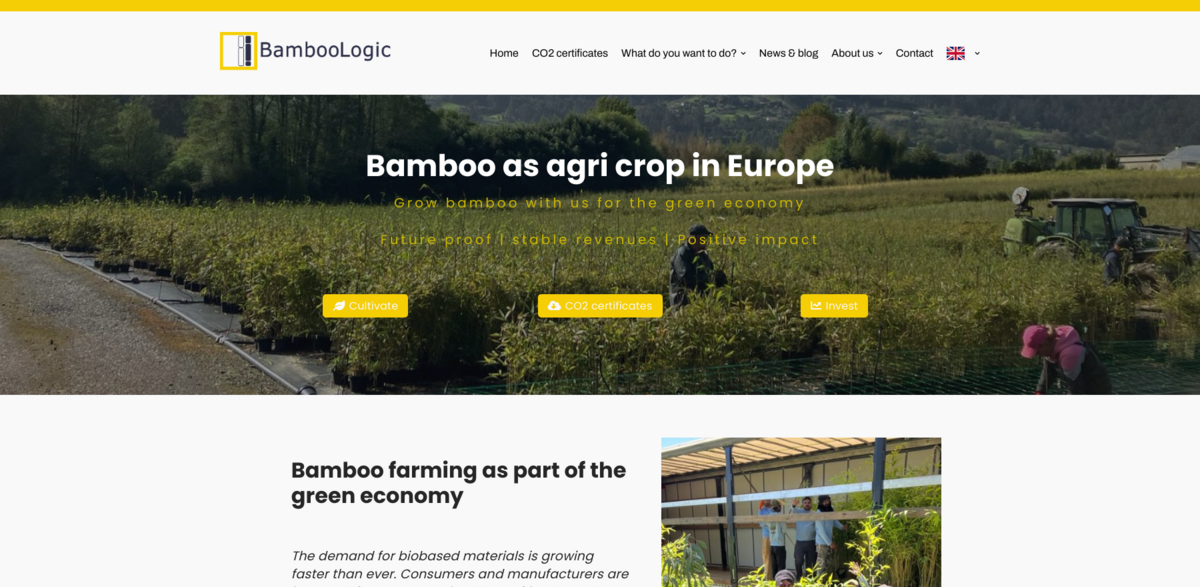What is BambooLogic?
BambooLogic is an innovative project centered around the cultivation of bamboo as an agricultural crop in Europe. The initiative is all about growing bamboo for the green economy, combining future-proof agricultural practices with stable revenues and a positive environmental impact. Bamboo is not only a fast-growing plant but also an eco-friendly alternative for materials like steel, wood, PVC, cotton, silica, and fossil-based composites. By controlling the entire value chain from plant propagation to market access, BambooLogic connects the production of bamboo with its eventual use, ensuring that every stage—from field to customer—is managed with sustainability in mind. This project underpins the development of Europe’s first bamboo plantations on an industrial scale, spanning over 2,000 hectares and converting degraded or abandoned agricultural land into vibrant, productive ecosystems.
Main Benefits
Key figures and facts demonstrate the strength of BambooLogic’s approach:
- Leading in Europe by providing bamboo for the biobased industry
- Complete chain: from plant propagation to market access
- Bamboo farm network operating in 7 European countries
- 14 sales points strategically spread across 10 European countries
- Team with bamboo experience extending back to the 1980s
- Innovative Bamboo CO2-certificates that offset footprints
Bamboo: Nature’s Fast and Sustainable Supercharger
BambooLogic emphasizes the unique qualities of bamboo—imagine the fastest-growing plant that yields on average 15 times more wood than a tree. With its rapid maturation and potential for stable harvesting over more than 100 years, bamboo provides a renewable resource that is as fast as it is promising. Every part of this versatile plant can be put to good use. Bamboo absorbs huge amounts of CO2, regenerates soils, and retains water. In fact, bamboo farming excludes the use of pesticides or herbicides and steers clear of harmful practices like tillage and clear-cutting. This approach makes bamboo a nature-inclusive, sustainable raw material that truly acts as a supercharger for green initiatives. It’s fast… it’s sustainable… and it perfectly fits the growing demand for eco-friendly solutions.
Bamboo: A Green Alternative Material
Bamboo is rapidly emerging as a green alternative to conventional raw materials such as hardwood, softwood, PVC, and even steel. Its exceptional strength and flexibility, along with unique fiber capacities, push bamboo into new applications across various sectors. From producing ultra-soft textiles to manufacturing extremely strong carbon fiber, bamboo’s high silica content, fibers, and nutrients also make it valuable for both animal and human food, as well as for the pharmaceutical, beauty, and health care industries. The widespread use of bamboo is now evident in almost every European household, reflecting a strong demand that consistently outpaces supply, and underscoring the need for local, sustainable resources.
Bamboo CO2-Certificates and Environmental Impact
Another groundbreaking aspect of the BambooLogic project is the introduction of Bamboo CO2-certificates. These certificates represent a new way of creating positive change—by offsetting carbon footprints and supporting local farming practices. Recognized by the European Union, these certificates help to quantify the environmental benefits derived from bamboo’s rapid growth and carbon sequestration capabilities. They serve as a tangible metric of the project’s commitment to reducing CO2, enhancing biodiversity, and contributing to climate action. It is an innovative solution, aligning economic benefits with environmental sustainability and offering an accessible tool for businesses and individuals alike to get involved in the green economy.
Bamboo Farming and Sustainability
BambooLogic is not just about utilizing an exceptional natural resource; it is also about revolutionizing agriculture in Southern Europe by converting abandoned lands into thriving bamboo plantations. Farming bamboo means investing in a crop that is both renewable and biodegradable—a crop that makes continuous contributions to environmental health. Bamboo farming generates employment in both the fields and factories, breathing new life into rural communities while fostering sustainable industrial growth. The entire project is a testament to how agricultural innovation can drive economic development while preserving the natural environment for future generations.
Project Impact on SDGs
- SDG 8: Decent Work and Economic Growth – through job creation on plantations and in associated industries
- SDG 12: Responsible Consumption and Production – by promoting sustainable agricultural practices and the use of eco-friendly materials
- SDG 13: Climate Action – thanks to bamboo’s significant CO2 absorption and its innovative CO2-certificates
- SDG 15: Life on Land – through the regenerative use of degraded land and the promotion of biodiverse ecosystems
- SDG 9: Industry, Innovation, and Infrastructure – by setting up pioneering industrial-scale plantations and sustainable production chains
Future Prospects for the Bamboo Industry
The future of bamboo in Europe looks exceptionally bright, and BambooLogic is paving the way for a sustainable bamboo industry. The project’s aim to develop industrial-scale bamboo plantations, with an area surpassing 2,000 hectares, opens up immense prospects for the European biobased industry. With every day bringing new applications and innovations that harness bamboo as a raw material, the industry is poised for exponential growth. The local industries benefit from the use of sustainable alternatives for materials such as hardwood, softwood, PVC, steel, and more. In Southern Europe, abandoned agricultural lands are finding new life under the care of bamboo farmers passionate about creating green, inclusive, and future-proof agricultural practices. This forward-looking vision not only boosts local economies but also builds a resilient foundation for a sustainable future—one where nature and industry move forward in tandem, bringing environmental, social, and economic benefits to all.


















